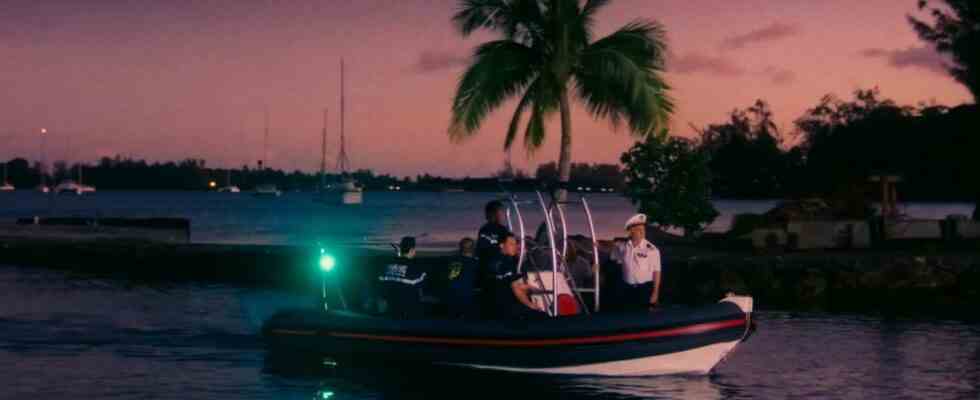For example the scene with the wave. High Commissioner de Roller, representative of the French state in French Polynesia, takes a trip on the water. To show presence, to offer favors to the island’s top surfers. Or to get out of the office where you don’t see him once during the film. De Roller’s office is the island itself, with its bungalows and nightclubs, its vegetation and the ocean.
So De Roller gets on a man on a jet ski and in the background this giant breaker is rolling towards him and the camera. Both just manage to slide over the wave. The scene is breathtaking because it is real and appears to have been captured accidentally. By comparison, James Cameron’s digitally animated “Avatar” waterworld extravaganza looks like a kid’s paddling pool.
If there’s a reason to go to the cinema these days to see something you can’t see anywhere else, it’s ‘Pacifiction’, Albert Serra’s masterful, one-of-a-kind film that screened in competition at Cannes last year. The earlier works of the avant-garde Catalan filmmaker revolved around historical figures such as Don Quixote, Louis XIV or Casanova and provoked with bodies that were as eccentric as they were indolent. “Pacifiction”, on the other hand, dives into the present and is unusually narrative by Serra’s standards, with the plot regularly piling up like a wave movement, breaking, then going away again.
There’s a tremendous amount of love in this Polynesian international cast
It’s all about assumptions that never materialize. De Roller is told rumors that excite local people: the French state is planning to resume nuclear weapons tests in the atoll, and nuclear submarines are said to have appeared off the coast. A naval admiral who drinks heavily, takes drugs (“but only on land!”), and is interested in young men makes vague suggestions. The High Commissioner conducts investigations in nightclubs, hotel gardens, on the beach, and again and again at sea. He talks to everyone, smiles, charms, manipulates, negotiates, looking for information. But he finds – nothing.
Perfect politeness, lascivious aggressiveness: Benoît Magimel (middle) represents the French state on the island.
(Photo: Film Gallery 451)
Benoît Magimel, the French acting star, dressed in light-colored suits and brightly colored Hawaiian shirts, his gaze hidden behind tinted glasses, bestows on de Roller an inimitable mixture of perfect politeness and lascivious aggressiveness, like a graceful predator ready to rush at any time and never die loses temper.
Then there’s gentle Shannah, played by actress Pahoa Mahagafanau, trans or “mahu,” the Polynesian term for a third cross-gender. Or that obese and functionless Catalan, embodied by Lluís Serrat, one of Serra’s regular actor, who always seems to be on the verge of falling asleep. You can feel an enormous love and mutual respect in this Polynesian-international cast, the desire to dare an experiment together, in which no one ever raises their voice above that of another.
The success of the company is all the greater as the danger of its failure is omnipresent. The almost three-hour film dispenses with any superordinate dramatic structure. And then there is the risk of exoticism. “Pacifiction” is a beautiful film, bathed in tropical light and paradisiacal red tones, as if the sun were always rising or setting.
And yet the narrative never loses its tension, while the filmmaker’s working method eliminates all clichés. Even the most minimal gesture of Magimel, which reminded Serra of the star’s previous films, of tics and mannerisms, was removed during the editing. During the shoot, the actors didn’t know when they were being filmed. Instructions were given during takes. Serra later intuitively selected the material for the final cut from more than five hundred hours, without considering dramaturgical necessities. Chaos and chance rule (almost) everything, the artist only comes to the fore as the decision-maker in order to give up his control.
This creates a phantasmagoria in which the exoticism with its colors as well as the postcolonial theme is nothing but a Pacific “fiction”. The things we see on screen seem to us to be hallucinating as much as the characters do. As if the Catalan Serra were following the “paranoid-critical” method of his compatriot Salvador Dalí, immersing himself in a delirious interpretation of reality.
Conspiracy paranoia, neo-colonialism and imperialism are dealt with without dying away into well-researched topics. Here they appear as if in a dream, condensed into lights, colors and bodies. The result is reminiscent of Coppola’s “Apocalypse Now”, Chantal Akerman’s “Almayer’s Folly” or Lucrecia Martel’s “Zama”. Like its predecessors, “Pacifiction” is a film about colonialism as a consciousness and imagery from which there is no escaping.
The ideas of nuclear tests or submarines off the coast are shown as ridiculous in the film and yet haunt everyone, even the French military. The paranoia becomes the state of the world that breaks over us like that giant wave and pushes us into the cinema seat, frightened and happy at the same time that we have never seen anything like this before.
Pacifiction, France / Spain / Germany / Portugal 2022 – Director and script: Albert Serra. Camera: Arthur Tort. With Benoît Magimel, Pahoa Mahagafanau, Marc Susini. Film gallery 451, 163 min. Theatrical release: February 2nd, 2023.

